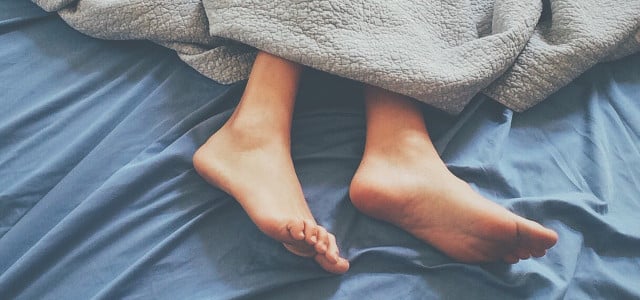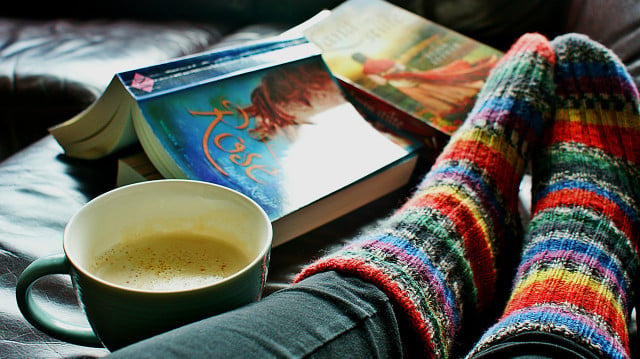
Cold feet in bed can also occur in warm temperatures – they generally reduce well-being and can also affect the quality of sleep. You can find out the causes of the phenomenon and what helps against it here.
It’s actually summery warm, but you’re lying in bed with cold feet? If the outside temperature is not the reason, then cold feet in bed are triggered by other factors, such as blood pressure or the psyche.
Once you have identified the exact cause of your freezing feet, it will be easier to address the problem and sleep better again.
Cold feet in bed: the causes
When it’s freezing cold outside and you’re only walking around in thin socks, cold feet are a logical consequence. But some people still have to struggle with a cold feeling in their feet even on warm days and even with the thickest duvet. Then cold feet in bed can have the following causes:
-
Poor Circulation: One of the most common causes of cold feet in bed is poor circulation. During sleep, blood circulation in extremities such as the feet can decrease, which can lead to a feeling of coldness. According to the Apotheken-Umschau, blood pressure that is generally too low can also be the trigger for cold feet. This is often harmless and occurs particularly frequently in young and slim women, older or particularly tall young people. However, low blood pressure can also be the symptom of serious illnesses and conditions. It is therefore advisable to have this checked out by a doctor.
-
Low room temperature and drafts: Even in the summer, a cool room temperature can contribute to cold feet in bed, especially if the duvet is not warm enough. Even if you sleep right next to an open window or are exposed to drafts in bed, your feet can start to freeze at first.
-
Mental disorders: Feelings of stress, but also depression and other mental illnesses can also lead to poor blood circulation in the body. As the Apotheken-Umschau explains, cold feet then occur in connection with other symptoms.
-
Vascular diseases: According to GEO magazine, arteriosclerosis in particular can also promote cold feet in bed. This is because the arteries narrow and the blood flow is impaired. As a result, blood circulation also gets worse here.
-
Hormonal factors: Even if there is a hormonal imbalance in the body, cold feet occur more quickly. According to GEO, this is the case, for example, with hypothyroidism.
-
Medication: Certain medications also promote the sensation of cold in the feet. These include medicines for high blood pressure, or certain headache medicines.
What helps against cold feet in bed?

(Photo: CC0 / Pixabay / FotoRieth)
Tired of constantly having cold feet in bed? The following tips can help you get the problem under control:
-
Quit smoking: Smoking can promote artery disease in the legs, leading to cold feet. So if you smoke regularly and often have cold feet in bed, that could be the cause. You can get more information and tips on this in our article “Smoking: recognizing and combating withdrawal symptoms”.
-
Warm socks: Wearing loose, breathable and warm socks made from natural materials can help keep feet warm without restricting blood circulation.
-
Foot massage and foot bath: A gentle foot massage before bedtime can promote blood circulation and relax muscles, which reduces heat output. A warm footbath in the evening can also prevent your feet from cooling down quickly at night.
-
Quality Linens: Use quality comforters and sheets that provide adequate insulation and retain body heat. See also: Organic Bedding: The Most Beautiful Sustainable Bedding Sets.
-
Exercise and activity: Exercising regularly can strengthen muscles and increase blood flow, which can help reduce cold feet.
-
Hot-water bottle or electric blanket: Use a hot-water bottle or electric blanket to warm the bed and keep your feet warm before you go to sleep.
-
Relaxation Techniques: Stress and tension can affect blood flow. Relaxation techniques such as breathing exercises or meditation can help to improve blood circulation – especially if psychological factors are the trigger for cold feet.
If cold feet in bed are a common problem affecting your quality of sleep, it may be wise to seek medical advice. Occasionally, cold feet can also indicate underlying health problems such as poor circulation or nerve problems. Depending on the underlying disease, special therapeutic measures can be taken in this case, which also alleviate the problem of cold feet.
Read more on Techzle\.com:
- Sleeping Naked: Healthy or Unhygienic?
- Sleeping in the heat: 12 mistakes and how to avoid them
-
Beautiful feet: tips for natural care